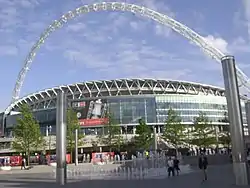FA Cup Final
The FA Cup Final, commonly referred to in England as just the Cup Final, is the last match in the Football Association Challenge Cup. It has regularly been one of the most attended domestic football events in the world, with an official attendance of 89,472 at the 2017 final. The 2020 event has been the exception, due to the Coronavirus pandemic. The Final is the culmination of a knockout competition among clubs belonging to The Football Association in England, although Scottish and Irish teams competed in the early years and Welsh teams regularly compete, with Cardiff City winning the Cup in 1927 and reaching the final in 1925 and 2008. Since 1923 it has been played mostly at Wembley Stadium.
| FA Cup Final | |
|---|---|
 The new Wembley Stadium on 19 May 2007, the day it held its first FA Cup Final | |
| Status | Active |
| Genre | Sporting event |
| Date(s) | May or June |
| Frequency | Annual |
| Location(s) | London, England, UK |
| Inaugurated | 1872 |
| Organised by | The Football Association |
As of 2020, 139 FA Cup Finals have been played. The latest final was held on 1 August 2020 and was contested between Arsenal and Chelsea, with Arsenal winning 2–1.
History
The first FA Cup Final was held at Kennington Oval on 16 March 1872 and was contested between Wanderers and Royal Engineers, with Wanderers winning 1–0.
After the 1873 final was held at Lillie Bridge, the event was held at the Oval until 1892. The 1893 and 1894 finals were respectively held at Fallowfield Stadium in Manchester and Goodison Park in Liverpool, before the event returned to London in 1895, being held at Crystal Palace until the outbreak of World War I. After the war, the event was held at Stamford Bridge, before Wembley Stadium opened in 1923. The first final at Wembley, in which Bolton Wanderers beat West Ham United 2–0, had an official attendance of 126,047, although the actual figure is believed to be as much as 300,000. It is widely known as the "White Horse Final", after a police horse named 'Billy' was used to restore order after the huge crowd spilled onto the field. The 1927 final saw "Abide with Me" being sung for the first time at the Cup final, which has become a pre-match tradition.[1]
Wembley continued to host the final until 2000, when it closed for redevelopment. The Millennium Stadium in Cardiff hosted the final between 2001 and 2006, before the new Wembley Stadium opened in 2007.
Up to and including 1998, if the final ended in a draw, a replay would be required. This occurred on 14 occasions, the last being in 1993 between Arsenal and Sheffield Wednesday. In September 1998, the Football Association decided that all future finals would be decided "on the day", meaning that a penalty shootout would decide the winner if the score was level after normal and extra time.[2] Two finals since have been decided by a penalty shootout, those of 2005 (Arsenal defeating Manchester United) and 2006 (Liverpool defeating West Ham United).
Stan Mortensen's hat-trick for Blackpool in 1953 is the only hat trick ever scored at Wembley in the competition's final.[3] Everton's Louis Saha scored a goal after 27.9 seconds in the 2009 FA Cup Final. It is currently the fastest goal in FA Cup Final history. Bury's 6–0 victory over Derby County in the 1903 FA Cup Final and Manchester City's 6–0 victory over Watford 2019 FA Cup Final are the largest winning margins. With his goal in the 2012 Final, Chelsea's Didier Drogba became the first player to score a goal in four finals.
The FA Cup Final is one of ten events reserved for live broadcast on UK terrestrial television under the Ofcom Code on Sports and Other Listed and Designated Events.
Winners
- For a full list of FA Cup winners and runners-up, see List of FA Cup Finals.
See also
Footnotes
- "Cup final competition for fans". Reading FC. 26 January 2015. Archived from the original on 29 January 2015. Retrieved 6 April 2016.
- Maume, Chris (24 September 1998). "Football: End of Cup Final replay". The Independent. Archived from the original on 26 August 2017. Retrieved 26 August 2017.
- "The Matthews Final" – BBC Sport
References
- Full results history at rsssf.com
- Archive of FA Cup editions at FastScore.com
- Post-war finals at sporting-heroes.net